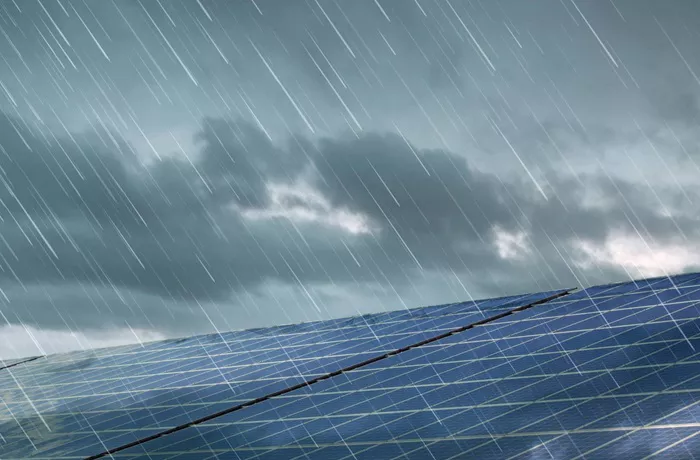Solar generators are becoming increasingly popular as a clean and efficient power source. They harness the sun’s energy to provide electricity, making them an attractive option for both residential and portable power needs. However, a common question arises: Do solar generators work in the rain? In this article, we will explore this topic in depth, examining how solar generators function in different weather conditions, including rain.
Understanding Solar Generators
To answer whether solar generators work in the rain, it’s crucial first to understand what they are and how they operate. Solar generators consist of solar panels, a battery storage system, and an inverter.
Components of a Solar Generator
Solar Panels: These are the devices that convert sunlight into electrical energy. Made up of photovoltaic cells, they capture sunlight and produce direct current (DC) electricity.
Battery Storage: The electricity generated by the solar panels is stored in batteries. This stored energy can be used when sunlight is not available, such as at night or during cloudy weather.
Inverter: This component converts the stored DC electricity into alternating current (AC) electricity, which is used by most household appliances and devices.
Solar Panel Efficiency in Rain
One of the primary concerns about solar generators is their performance during rainy weather. Solar panels are designed to work in various conditions, including cloudy and rainy weather, though their efficiency can be affected.
How Rain Affects Solar Panels
Reduced Sunlight: Rain clouds block some of the sunlight that reaches the solar panels, which can reduce the amount of electricity generated. However, solar panels can still capture diffuse sunlight, so they will continue to produce power, albeit at a reduced rate.
Panel Cleaning: Rain can actually benefit solar panels by cleaning dust and debris off the surface. This cleaning effect can improve the panels’ efficiency once the rain stops and the sun comes out.
Solar Panel Performance Metrics
Performance Ratio: Solar panel manufacturers provide performance ratios that indicate how well the panels will perform under various conditions, including cloudy or rainy weather. High-quality panels generally have better performance ratios.
Output During Rain: While solar panels may produce less electricity during rainy days, they still contribute to the overall energy supply. The extent of the reduction depends on the intensity and duration of the rain.
Battery Storage and Rain
The battery storage system of a solar generator is designed to store energy regardless of weather conditions.
Battery Functionality
Energy Storage: The batteries store excess energy generated during sunny periods. This stored energy can be used during rainy days or nighttime, ensuring a continuous power supply.
Battery Life: The life of the batteries is not significantly affected by rain. However, it is essential to protect the batteries from water exposure to prevent any damage.
Inverter Performance
The inverter, which converts DC to AC power, is housed in a weatherproof enclosure. It continues to function effectively in rainy conditions as long as it is properly protected from direct exposure to water.
see also: Do Solar Generators Work At Night?
Practical Tips for Using Solar Generators in Rain
To maximize the efficiency and longevity of your solar generator, consider the following tips:
Installation Considerations
Proper Placement: Ensure that the solar panels are installed at an angle that allows for effective water runoff. This helps prevent water accumulation and potential damage.
Weatherproofing: Make sure that all components, including the inverter and battery storage, are housed in weatherproof enclosures to protect them from rain.
Maintenance Tips
Regular Cleaning: Keep the solar panels clean to ensure they operate efficiently. Rain will help with this, but periodic inspections and cleanings are still necessary.
Monitoring Performance: Use monitoring systems to track the performance of your solar generator. This can help you identify any issues related to weather conditions.
Conclusion
In summary, solar generators can indeed work in the rain. While their efficiency may be reduced due to decreased sunlight, they continue to generate power and provide a reliable energy source. The battery storage system ensures that you have a backup power supply even on cloudy or rainy days. By properly installing and maintaining your solar generator, you can optimize its performance and ensure it meets your energy needs in various weather conditions.
FAQs:
How much does rain affect solar panel efficiency?
Rain can reduce the efficiency of solar panels because it blocks some sunlight. However, solar panels can still produce power from diffuse sunlight, and the overall impact is often less significant than expected.
Can solar panels be damaged by rain?
Solar panels are designed to be weather-resistant and can withstand rain. However, it’s important to ensure that they are properly installed and that all components are protected from direct water exposure.
How do I maintain my solar generator during rainy weather?
Regular maintenance includes cleaning the panels to remove debris, ensuring that the installation is secure and properly angled for water runoff, and protecting all components from direct water exposure.
Will my solar generator still work at night or on cloudy days?
Yes, a solar generator will work at night or on cloudy days using the energy stored in its batteries. Solar panels generate electricity during daylight hours, and this energy is stored for use when sunlight is not available.
Related topics:
- TOP 4 Whole Home Solar Generators
- How Solar Power Can Interact With Generator Systems?
- 3 Best Value Solar Generator

